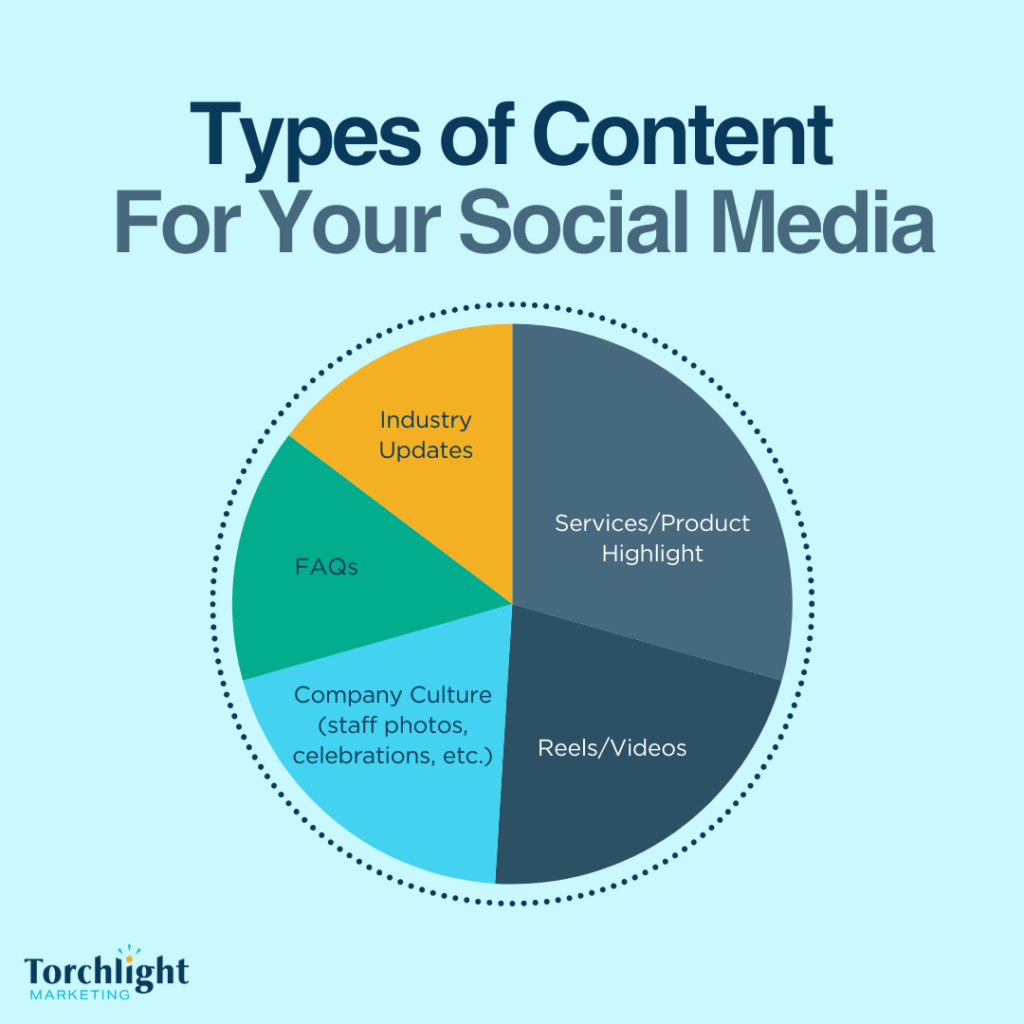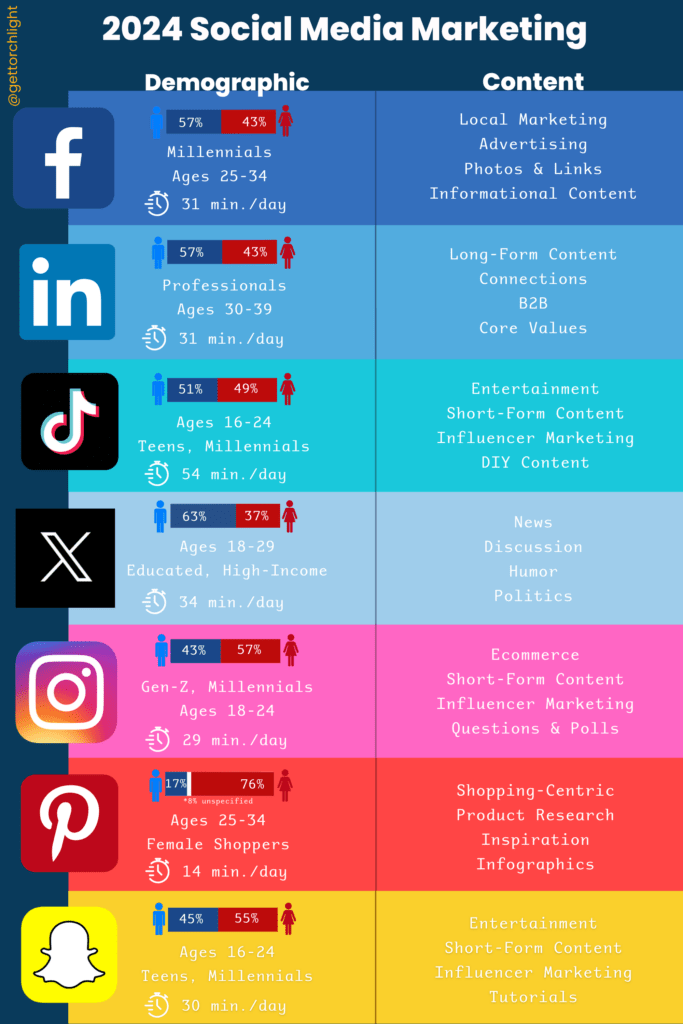It is no secret the social media marketing industry has been booming over the last several years. We’re sure you know the importance of reputation management and having your business on multiple platforms with consistent brand information (operating hours, address, phone number, etc.) across each one of them. But did you know that global ad spend for social media marketing is projected to reach over $219 billion in 2024? With that in mind, it’s not just theory but a fact that social media marketing isn’t going anywhere anytime soon.
In this blog, we will unravel the pros and cons of social media marketing— the intricacies that lead to brand exposure, audience engagement, and trust-building. With any knowledge that we share at Torchlight Marketing, we’re going to give you the whole picture: the good, the bad and the ugly of social media.
Pros of Social Media Marketing
1.Increases Brand Exposure
In the digital age, where billions of users engage on social media platforms daily, businesses can strategically leverage these social media channels to expand their brand exposure. To maximize visibility, employing paid advertising options allows precise targeting of specific demographics, tailoring promotional messages to resonate with the intended audience.
Moreover, creating shareable content is pivotal for sustained brand exposure. Crafting content that resonates emotionally, sparks curiosity, or provides practical value is essential. Shareable content serves as the currency of virality, extending reach beyond immediate followers and creating a ripple effect across social networks. In essence, by combining strategic approaches such as paid advertising and trend participation with the creation of highly shareable content, businesses can navigate the digital era’s opportunities to propel their brand into the forefront of the social media landscape.
2. Helps With Audience Engagement
Social media serves as a dynamic arena where businesses can foster direct and meaningful interactions with their audience, transcending the traditional boundaries of advertising. This two-way communication is facilitated through a spectrum of engagement tools, including comments, likes, shares, and direct messages. Successful brands adeptly leverage these features to create a vibrant sense of community.
For instance, running interactive polls on platforms like Instagram or X, formerly known as Twitter, provides an avenue for real-time feedback, allowing businesses to involve their audience in decision-making processes. Hosting live Q&A sessions goes a step further, offering an intimate space for direct interaction, where the audience can pose questions, share insights, and experience the brand in a more personal light.
More importantly, the essence of social media engagement lies in its ability to showcase the human side of a brand. Businesses that respond promptly and authentically to user comments or direct messages demonstrate a commitment to open communication. This authentic responsiveness goes beyond scripted interactions, resonating with audiences who seek genuine connections with the brands they support.
3. Provides Targeted Advertising Options
In the realm of digital marketing, platforms have revolutionized advertising strategies by providing sophisticated targeting options. The power of data-driven advertising is exemplified through the ability of businesses to leverage analytics, gaining profound insights into their target audience’s demographics, interests, and behaviors. By delving into the nuances of consumer data, businesses can comprehend the intricacies of their audience’s preferences and habits, enabling a more nuanced and personalized approach to advertising.
This data-driven precision is pivotal in crafting tailored messages and offers that resonate with specific segments of the audience. The importance of personalization cannot be overstated, as it not only enhances the relevance of marketing content but also fosters a deeper connection with the audience.
4. Social Media Marketing Is Cost-Effective Marketing
Social media marketing often proves to be more cost-effective than traditional advertising methods. Small businesses, in particular, can benefit from this as they can achieve significant reach with a modest budget in networks such as Facebook Ads.
Setting clear campaign objectives is the foundational step, allowing businesses to define their goals and tailor their strategies accordingly. However, monitoring key performance indicators (KPIs) is crucial in gauging the effectiveness of campaigns; providing actionable insights into what resonates with the audience. By regularly assessing performance metrics, businesses can identify areas for improvement and make data-driven decisions to enhance their advertising efforts.
A/B testing emerges as a powerful tool in this context, enabling businesses to experiment with different variations of targeting and messaging to determine the most effective combination. This iterative approach not only refines the overall strategy but also ensures that ad spend is directed towards approaches that yield the best results.
5. SEO Benefits
It wouldn’t be a Torchlight Marketing article if we didn’t touch on SEO! The intertwining of social media and search engine optimization (SEO) introduces a dynamic dimension to digital marketing strategies. Although the nature of the relationship is a subject of debate, evidence suggests that social signals wield a positive influence on search engine rankings, emphasizing the significance of a robust social media presence in the broader SEO landscape.
To harness this connection effectively, businesses can adopt actionable tips that integrate social media seamlessly into their overall SEO strategy. Cultivating an active and engaged social media community contributes to social signals, indicating to search engines that the content is valuable and relevant. Additionally, businesses should ensure consistency in their brand messaging and business information (phone number, address, operating hours, etc.) across social platforms and their website, reinforcing a cohesive digital identity. The potential impact on website visibility is substantial, as search engines may prioritize content with strong social signals, enhancing its chances of appearing prominently in search results.
Cons of Social Media Marketing
1. It Is Time-Consuming
Managing social media accounts, creating engaging content, and responding to audience interactions can be time-consuming. The demand for consistent effort may pose challenges, especially for businesses with limited resources.
To effectively manage the demands of social media, businesses can implement strategic time-management approaches. Creating a content calendar serves as a cornerstone, allowing for the planned creation and scheduling of posts in advance. This not only streamlines the content creation process but also ensures a regular cadence of posts, maintaining a consistent online presence. Leveraging social media management tools is another invaluable strategy, as these tools enable businesses to automate certain tasks, monitor engagement, and analyze performance metrics efficiently.
2. There Are Overwhelming Options When It Comes To Social Media Marketing
The multitude of social media platforms can be overwhelming, and not all may be suitable for every business. Choosing the right platforms requires understanding the target audience and aligning with business goals.
The type of products or services you offer can greatly influence which social media platforms will be most effective for your marketing efforts. For instance, visually-driven products, such as fashion or food, may perform better on Instagram or Pinterest, where high-quality images and videos can showcase your offerings attractively. It’s also important to know what demographics are on what platforms. Understanding where your target audience spends their time online is crucial for ensuring your marketing messages are seen by the right people.
3. Measurement Challenges
Calculating the return on investment (ROI) from social media can be complex, as the benefits often extend beyond direct revenue generation to include qualitative aspects like brand recognition and customer loyalty. These intangible outcomes, while crucial for brand building, are not always easy to measure in monetary terms.
On the other hand, quantifiable metrics such as engagement rates, website traffic from social media, and conversions can offer insights into the effectiveness of social media strategies. However, attributing sales directly to social media efforts requires careful analysis of analytics and the customer journey, making it a nuanced challenge for marketers.
4. It Is Saturated and Highly Competitive
The digital landscape is becoming increasingly crowded as more businesses turn to social media to connect with their audiences. This surge in competition means that simply having a presence on these platforms is no longer sufficient to capture and retain the attention of potential customers. To truly stand out, businesses must employ a combination of creativity in their content, consistency in their posting schedule, and a strategy that is finely tuned to the interests and needs of their target audience. Engaging and original content that speaks directly to the audience’s preferences can help a brand distinguish itself in a sea of competitors.
5. Social Media Marketing Has Constant Algorithm Changes
The ever-evolving algorithms of social media platforms play a significant role in determining how content is distributed and seen by users. These changes can drastically affect the organic reach of posts, making it challenging for businesses to maintain consistent visibility among their target audience.
Adapting social media strategies in response to these updates is key to ensuring content continues to engage and reach viewers effectively. This might involve altering content formats, posting schedules, or engagement tactics. By being proactive and flexible, businesses can optimize their social media presence, ensuring their messages resonate with their audience despite algorithmic shifts.
Takeaway
In the rapidly evolving landscape of social media marketing, businesses face both unprecedented opportunities and notable challenges. As the digital arena becomes increasingly saturated, standing out demands a blend of creativity, strategic consistency, and an intimate understanding of one’s target audience. The potential for brand exposure, audience engagement, and the benefits of targeted advertising underscore the power of social media as a pivotal marketing tool. However, navigating this complex terrain requires not just an awareness of the potential pitfalls but also a commitment to adapt and innovate.
To learn more about our services contact us on our website or give us a call at (805) 481-0118.




